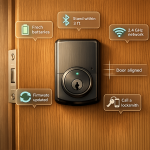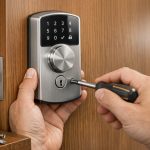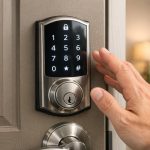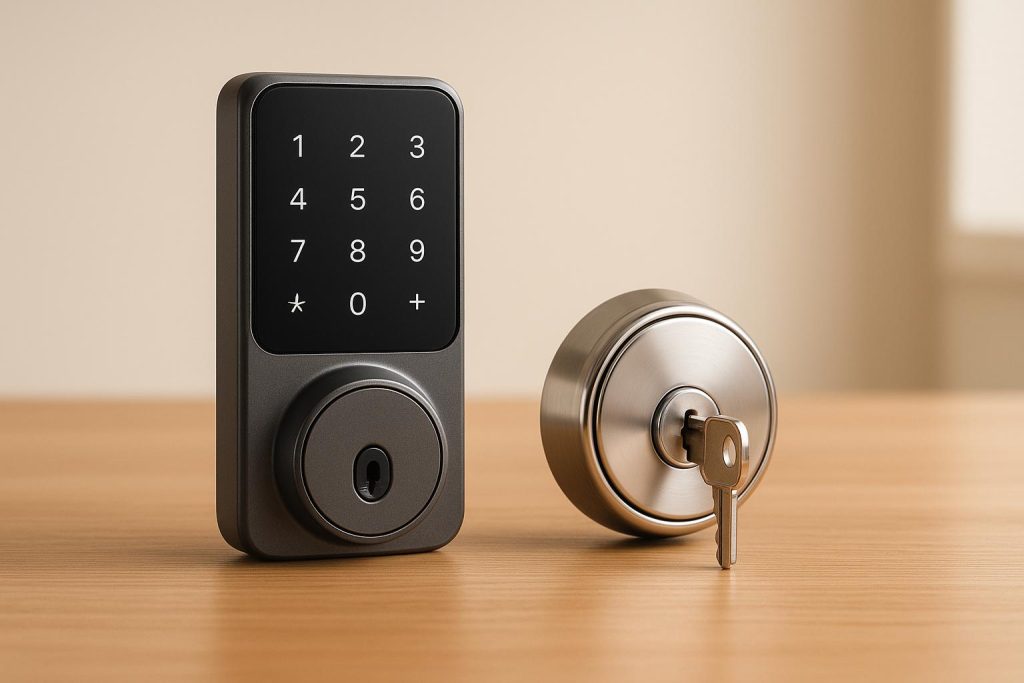When deciding between smart locks and key locks, your choice should align with your security needs, lifestyle, and budget. Here’s a quick breakdown:
- Smart Locks: Offer remote access, temporary codes, and integration with smart home systems. Ideal for tech-savvy users, frequent travelers, or homes with multiple users. Costs range from $150–$400 upfront, plus $10–$20 annually for batteries. Regular maintenance includes software updates and battery replacements. Lifespan averages around 4 years.
- Key Locks: Simple, reliable, and cost-effective. Best for those who prefer low-maintenance options and mechanical reliability. Costs start at $12, with minimal upkeep. Can last over 20 years with basic care but lack remote features or monitoring.
Key Considerations:
- Security Needs: Smart locks provide real-time monitoring and alerts, while key locks rely on physical deterrence.
- Access Requirements: Smart locks enable remote access and manage multiple users easily. Key locks require physical key management.
- Maintenance: Smart locks need batteries and updates; key locks need occasional lubrication or rekeying.
- Budget: Smart locks are pricier upfront and require ongoing costs. Key locks are more affordable with lower long-term expenses.
- Lifestyle Fit: Choose smart locks for convenience and flexibility or key locks for simplicity and durability.
Quick Comparison:
| Feature | Smart Locks | Key Locks |
|---|---|---|
| Access Methods | Apps, keypads, fingerprints | Physical keys only |
| Power Requirements | Batteries (6–12 months) | None |
| Cost | $150–$400 upfront, $10–$20/year | $12–$200 upfront |
| Lifespan | ~4 years | 20+ years |
| Remote Access | Yes | No |
| Maintenance | Battery/software updates | Occasional lubrication |
| Integration | Smart home compatible | None |
Smart locks bring convenience and advanced features but require ongoing care. Key locks are dependable and budget-friendly but lack modern capabilities. Choose based on your specific needs.
How to Choose the BEST Keyless Entry Lock (Pros & Cons)
Check Your Security and Access Needs
When deciding between smart locks and traditional locks, it’s important to evaluate your specific security requirements. Consider factors like your daily routines, the size of your household, the safety of your neighborhood, and your personal preferences. By identifying potential risks and understanding your access needs, you’ll be better equipped to choose the right option.
Find Your Security Risks
Start by assessing your property for potential vulnerabilities. Look for issues like poorly lit entrances, weak door frames, or locks that could be easily tampered with. If you live in an area with higher crime rates or have dealt with security concerns in the past, smart locks might be appealing because they offer real-time monitoring and instant alerts if someone tampers with your door.
Traditional locks, on the other hand, can pose risks if a key is lost or stolen. Smart locks eliminate this worry but come with their own challenges, such as power outages, Wi-Fi disruptions, or battery failures, which could leave you locked out.
The visibility of your door also matters. If your door is hidden from the street, a smart lock with activity logging can give you detailed insights into who enters and exits. For doors that are easily seen, a sturdy traditional lock like a deadbolt can act as a clear deterrent to potential intruders.
Review Your Access Requirements
Think about how many people need regular access to your home and how often those needs change. If you have a large family or rent out your property, smart locks can simplify things by offering temporary codes and remote access options.
For households that frequently host guests – whether it’s Airbnb visitors, dog walkers, or housekeepers – smart locks provide flexibility. You can create time-limited access codes that automatically expire, eliminating the hassle of coordinating physical keys or worrying about unreturned spares.
Remote access is another key consideration. If you travel often or need to let someone in while you’re away, smart locks allow you to unlock your door remotely through a smartphone app. Traditional locks, however, require you to either be there in person or hand off a key ahead of time.
Don’t forget to think about backup access. Many smart locks offer multiple entry methods, such as keypads, smartphone apps, and physical backup keys. Traditional locks, while simpler, rely solely on physical keys, which some homeowners prefer for their reliability and ease of use.
Match Your Lifestyle and Maintenance Needs
The right lock should align with both your lifestyle and your willingness to handle maintenance. Households that already use smart home systems like Amazon Alexa, Google Home, or Apple HomeKit may find smart locks to be a natural fit, as they integrate seamlessly into these setups. On the other hand, if you’re not comfortable with technology, traditional locks might feel more straightforward and dependable.
Maintenance is another factor to weigh. Traditional locks require occasional lubrication and may need rekeying if keys are lost, but they can function for years with minimal upkeep. Smart locks, by contrast, need regular battery replacements (every 6–12 months), software updates, and occasional troubleshooting for connectivity issues. Keep in mind the ongoing costs, such as $10–20 annually for batteries or potential subscription fees for certain smart lock features, compared to the lower maintenance costs of traditional locks.
Your daily routine also plays a role. If you often forget to lock your doors or have an irregular schedule, smart locks with auto-locking and remote monitoring features can provide extra peace of mind. For households with consistent routines, a traditional lock may be all you need.
Finally, consider ease of use. For elderly individuals or those with arthritis, keypads or smartphone access can be more convenient than traditional keys. However, some people find touchscreens tricky and prefer the simplicity of a physical key for its tactile feedback.
Feature Checklist: Smart Locks vs Key Locks
Key Features to Compare
When deciding between smart locks and traditional key locks, it’s essential to weigh their key differences. Factors like access methods, power requirements, installation complexity, and overall costs can significantly influence your choice.
Smart locks offer a variety of access methods, including smartphone apps, keypads, fingerprints, and even voice commands through devices like Amazon Alexa or Google Home. On the other hand, traditional locks stick to the tried-and-true physical key, valued for its simplicity and dependability.
Power is another major distinction. Smart locks rely on batteries or electrical connections, with most needing battery replacements every 6–12 months, costing around $10–20 annually. They also depend on Wi-Fi or Bluetooth for remote operation. In contrast, traditional locks are fully mechanical, requiring no power and remaining unaffected by outages or connectivity issues.
When it comes to installation, smart locks often allow for DIY setup but involve additional steps like network configuration. Traditional locks, being straightforward mechanical devices, are easier to install without requiring extra infrastructure.
Durability is a key factor, too. Traditional locks can last over 20 years with basic maintenance, while smart locks tend to have a shorter lifespan, with many models experiencing technical issues or failures within about 4 years.
Cost is another consideration. Smart locks typically start at $250 for the device alone, with professional installation potentially adding another $250. In comparison, traditional locks can be as affordable as $12 for a basic model, with much lower installation costs.
The table below highlights these differences for a clearer comparison.
Comparison Table: Smart Locks vs Key Locks
| Feature | Smart Locks | Traditional Key Locks |
|---|---|---|
| Access Methods | Apps, keypads, fingerprints, voice commands, backup keys | Physical keys only |
| Power Requirements | Batteries (replaced every 6–12 months) or electrical connection | None – purely mechanical |
| Installation | More complex with network setup | Simple, no extra infrastructure needed |
| Maintenance | Battery changes, software updates, troubleshooting | Minimal – occasional lubrication only |
| Durability | Average lifespan of ~4 years, prone to technical issues | Over 20 years with basic maintenance |
| Initial Cost | $250+ for device, up to $250 for installation | $12+ for basic locks, lower installation costs |
| Ongoing Costs | $10–20 annually for batteries, possible subscription fees | Minimal – occasional key replacement |
| Remote Access | Yes – control from anywhere with internet | No – requires physical presence |
| Integration | Works with smart home systems | None |
| Security Monitoring | Real-time alerts, activity logs, tamper notifications | No monitoring features |
| Backup Options | Multiple entry methods available | Spare keys or locksmith assistance |
| Weather Resistance | Varies by model; electronics may be sensitive | Generally durable in all weather |
| User Management | Temporary codes, remote access for multiple users | Physical key distribution required |
Smart locks are ideal for those seeking convenience and advanced features like remote control and smart home integration. However, they come with added costs, regular maintenance, and a potentially shorter lifespan. Traditional locks, by contrast, are reliable, low-maintenance, and budget-friendly. For some households, the simplicity and durability of traditional locks make them a more practical choice, especially when avoiding the complexities and higher costs of smart lock installation.
sbb-itb-643e28e
Pros and Cons of Smart Locks and Key Locks
The choice between smart locks and traditional key locks often comes down to your specific security needs and lifestyle. Each option has its own set of strengths and weaknesses, which can help guide your decision.
Smart Locks: Benefits and Drawbacks
Benefits of Smart Locks
Smart locks bring a level of convenience and flexibility that traditional locks simply can’t match. With these devices, you can unlock your door remotely, grant temporary access to guests or service providers, and say goodbye to the hassle of carrying physical keys. Everyone in the household can have their own unique access code, which can be updated or deleted quickly – no rekeying required.
Another major perk is their ability to monitor activity. You can get real-time notifications when someone enters or exits, check detailed activity logs, and even receive tamper alerts if someone tries to force entry. For property managers or vacation rental owners, this can be a game-changer. In fact, over 65% of vacation rental owners reported fewer issues and better guest experiences after switching to smart locks. For properties with multiple doors, smart locks can also save significant rekeying costs, potentially cutting thousands of dollars annually.
Drawbacks of Smart Locks
On the flip side, smart locks come with a higher upfront cost. A single unit typically runs between $150 and $300, and if you opt for professional installation, that could add another $250.
Maintenance is another consideration. You’ll need to replace the batteries every 6 to 18 months, which could cost $10 to $20 per year, and keep the firmware updated. Smart locks also tend to have a shorter lifespan, often failing within about four years, unlike traditional locks that can last decades. Connectivity can be an issue as well, since most smart locks rely on Wi-Fi or Bluetooth. While many models include backup power options, these systems aren’t immune to glitches.
Key Locks: Benefits and Drawbacks
Benefits of Traditional Key Locks
Traditional key locks are known for their reliability. As purely mechanical devices, they aren’t affected by power outages, internet problems, or software malfunctions. They also excel in durability – residential lock hardware can last 20 years or more with minimal maintenance, such as occasional lubrication.
They’re also budget-friendly, with costs typically ranging from $30 to $50. Installation is straightforward and often doesn’t require a professional. Plus, since they lack electronic components, they hold up well in extreme weather conditions.
Drawbacks of Traditional Key Locks
However, traditional locks aren’t without their flaws. Physical keys can be lost, stolen, or copied, and there’s always the risk of a key breaking inside the lock. In the U.S., nearly 7 million property crimes occur annually, and 34% involve front doors with compromised locks or keys.
Traditional locks also lack the modern features of their smart counterparts. You can’t grant access remotely, monitor activity, or receive alerts about potential break-ins. Managing multiple keys can become a hassle, and rekeying a lock – at around $50 per event – adds to the inconvenience. Unlike smart locks, traditional options don’t integrate with smart home systems or provide detailed security insights.
As one user, meeds122, puts it:
"I trust the reliability of a mechanical device over an electronic one for long time scales, >10 years."
Professional Help and Installation Tips
Getting the perfect lock is only half the battle – proper installation is crucial to ensure it works as intended. A professional locksmith can help you avoid mistakes that could compromise your security or lead to costly repairs down the line. Once you’ve chosen the right lock, having it installed by an expert ensures you get the most out of your investment.
Why Use a Locksmith?
Why Installation Quality Shouldn’t Be Overlooked
Even the highest-quality locks can fail if installed incorrectly. A professional locksmith ensures your lock fits perfectly, minimizes wear on your door, and extends the lifespan of your hardware. This is especially critical for smart locks, where precision during installation can directly impact how well the lock functions.
Certified locksmiths bring a level of expertise and professionalism that guarantees the job is done right. Certification means they’ve been trained and tested to handle a wide variety of locks and situations, so you can trust their skills. With a locksmith, you’re not just paying for installation – you’re paying for peace of mind.
More Than Just Installation
Professional locksmiths don’t just install locks – they enhance your overall security. They can reinforce weak door frames, install pick-resistant locks, and set up advanced features like smart lock encryption. They’re also trained to spot vulnerabilities, like poorly reinforced strike plates or misaligned doors, that might go unnoticed.
For smart locks, locksmiths can integrate your new device with existing security systems, such as alarms or cameras, ensuring everything works together smoothly. This eliminates potential compatibility issues and gives you a more comprehensive security setup.
Protecting Your Investment
A locksmith does more than just put your lock in place – they assess your door, hardware, and security needs to recommend the best solution for your home. Professional installation also helps maintain manufacturer warranties, protecting your investment in the long run. Plus, many locksmiths offer post-installation support, so you’re not left on your own if something goes wrong.
Sherlock’s Locksmith Services
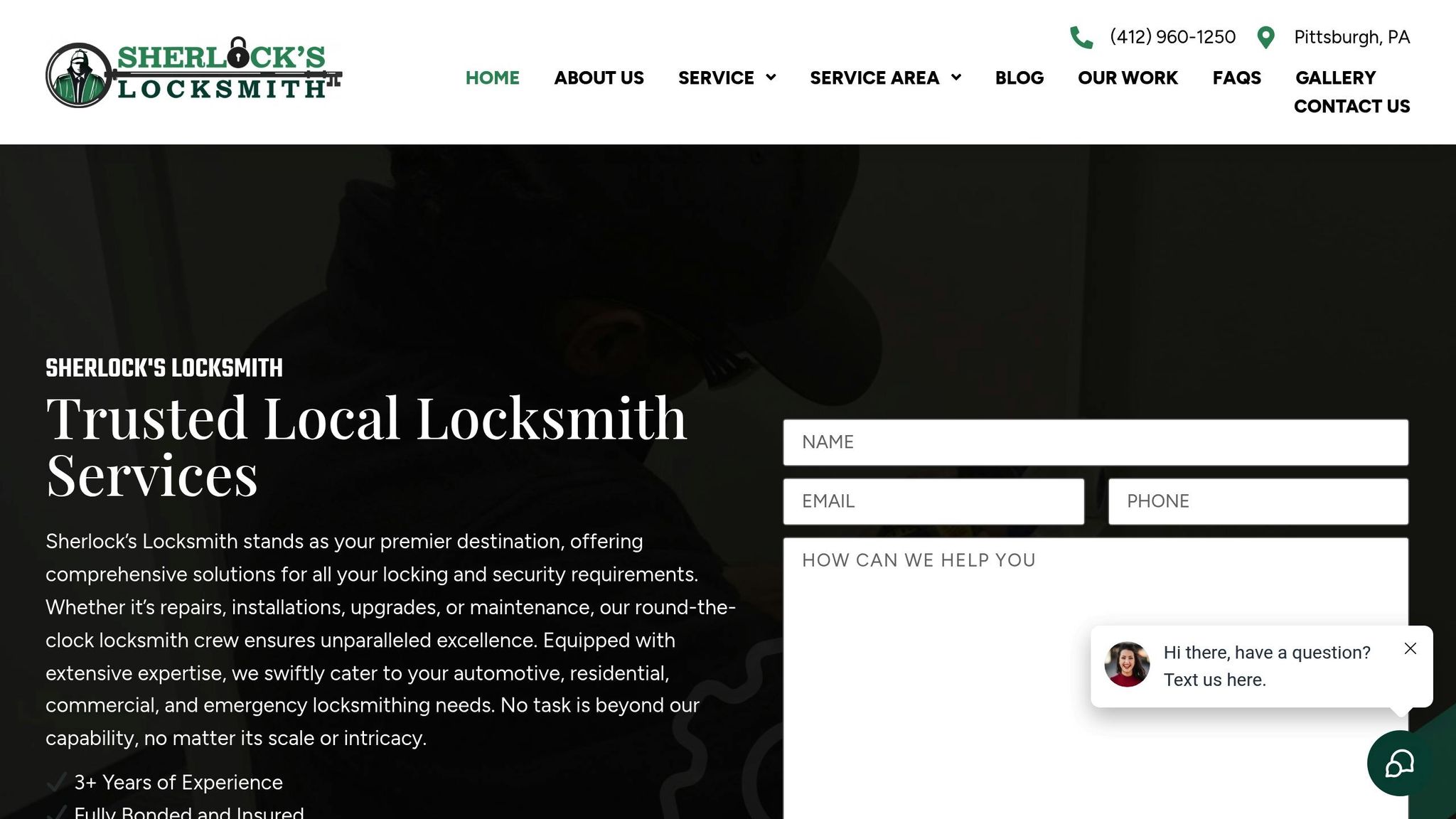
If you’re in the Pittsburgh area and looking to upgrade your home security, Sherlock’s Locksmith has the tools and expertise to handle both smart and traditional lock installations. Their certified technicians are equipped to manage everything from basic setups to complex smart home integrations.
Full-Service Lock Solutions
Sherlock’s Locksmith offers a complete range of residential services, including lock installation, rekeying, and security upgrades. Whether you’re interested in a smart lock with cutting-edge features or a traditional high-security lock, their team can recommend and install the best option for your needs.
Their offerings include keyless entry systems, biometric locks, and alarm integration for a fully connected smart home. If you prefer traditional locks, they provide high-quality installation and rekeying services to ensure your mechanical locks offer maximum protection.
24/7 Emergency Services
Lock issues don’t always happen during business hours. That’s why Sherlock’s Locksmith provides 24/7 emergency support, including help with lockouts and broken key extractions. This around-the-clock service is especially helpful if a smart lock malfunctions or its battery dies at an inconvenient time.
Expert Assessment and On-Site Installation
Before recommending a lock, Sherlock’s Locksmith evaluates your specific needs, door type, and existing hardware. This ensures that you get a solution tailored to your home, whether it’s a smart lock with remote access or a durable traditional lock.
Their mobile service brings everything needed for on-site installation and testing. From the moment they start, you can trust that your new lock will be installed seamlessly, integrating perfectly with your door and frame. Whether you choose a smart or traditional lock, Sherlock’s Locksmith ensures your home’s security is in good hands from day one.
Choosing the Right Lock for Your Home
When deciding between smart locks and traditional key locks, it’s all about finding the right balance between your security needs, lifestyle, and budget. Here’s how to make an informed choice.
Start by assessing your specific security requirements. If your home experiences frequent package deliveries, has multiple family members needing access, or is located in a busy neighborhood, smart locks might be a better fit. They offer flexibility and features like remote access and monitoring. On the other hand, if your security needs are straightforward and you prefer simplicity, traditional key locks might be the way to go. Once you’ve identified your needs, consider how much you’re willing to spend.
Think about the long-term costs as well. Smart locks typically cost between $150 and $400 upfront, while traditional locks range from $50 to $200. However, traditional locks may require occasional rekeying, which adds to the overall expense over time. Weigh these factors carefully to ensure you’re making a financially sound decision.
Your comfort with technology is another crucial factor. If you’re someone who enjoys using apps and values features like activity logs and remote control, smart locks will likely suit you. But if you’d rather avoid dealing with software updates or potential connectivity issues, a traditional lock offers the mechanical reliability you might prefer.
Don’t forget to check your door’s compatibility. Older doors or those with unusual dimensions may need modifications to accommodate a smart lock. Traditional locks, in contrast, tend to work with a wider variety of door types and existing hardware. If you’re unsure whether modifications are necessary, consult a locksmith to avoid installation headaches.
Speaking of professionals, it’s always a good idea to get expert advice. A locksmith, like Sherlock’s Locksmith, can assess your door, security needs, and hardware to recommend the best lock for your situation. Their technicians can also spot potential installation challenges and suggest adjustments to ensure everything works perfectly from the start.
Ultimately, your decision should balance security, convenience, and reliability. Whether you go for the tech-savvy features of a smart lock or the tried-and-true simplicity of a traditional one, quality hardware and proper installation will ensure your home stays protected.
FAQs
What are some common risks of using smart locks, and how can you protect against them?
Smart locks, while convenient, can be susceptible to hacking, malware, and unauthorized access, potentially compromising your home’s security. To minimize these risks, it’s essential to take proactive steps. Start by keeping your lock’s firmware up to date, as updates often include critical security patches. Use strong, unique passwords and enable multi-factor authentication for an extra layer of protection.
Strengthening your Wi-Fi network is another key measure – secure it with a strong password and consider monitoring lock activity for any unusual behavior. If you don’t need remote access, disabling it can further reduce vulnerabilities. Additionally, using network segmentation to isolate your smart devices can make it harder for attackers to gain control.
By following these precautions, you can enjoy the convenience of a smart lock while keeping your home secure against potential cyber threats.
How can I tell if my door works with a smart lock, and will I need to make any changes to install one?
To determine if your door is compatible with a smart lock, start by checking its thickness. Most smart locks are designed to fit doors that are between 1-3/8 inches and 2 inches thick. Next, measure the backset, which is the distance from the edge of the door to the center of the lock. This measurement is usually either 2-3/8 inches or 2-3/4 inches. Also, confirm that your door material – whether wood or metal – is suitable. Keep in mind that some smart locks may not work with glass or sliding doors.
If the size or placement of your current lock doesn’t match the smart lock’s requirements, you might need to make adjustments. This could involve reinforcing the door, modifying the backset, or using filler plates to ensure everything fits securely. For a hassle-free installation, you might want to consult a professional locksmith, such as Sherlock’s Locksmith, to ensure your smart lock is installed correctly and provides the security you need.
What should I consider when deciding if smart locks are worth the investment compared to traditional key locks?
When weighing whether smart locks are a good investment, it’s essential to look at a few key factors: upfront cost, long-term savings, and convenience. While these locks tend to come with a higher price tag initially and might need more upkeep due to their electronic parts, they can pay off in the long run. For instance, they eliminate the need for rekeying and provide handy features like remote access and added security.
Consider what matters most to you. Do you want the ease of keyless entry or the ability to control your locks with a smartphone? Or is durability and minimal maintenance your top priority? Taking a closer look at these factors can help you decide if the advantages of smart locks justify the upfront expense for your home.



